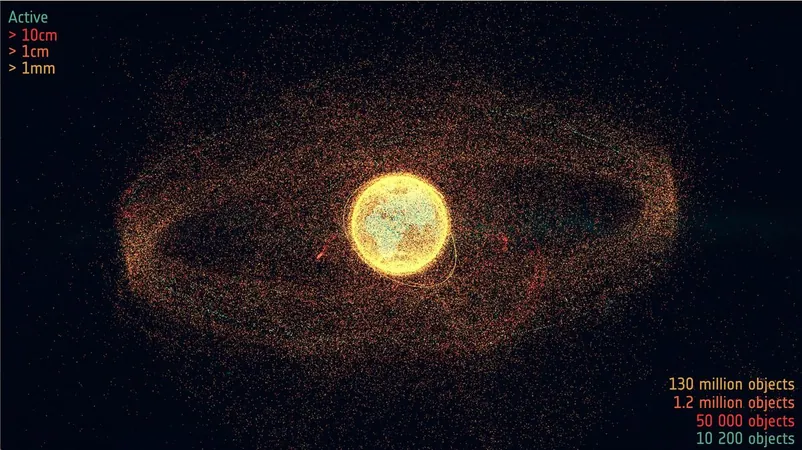
Unleashing Innovation at QCon London 2025: Key Insights from Day One
2025-04-13
Author: Sophie
A Glimpse into Day One of QCon London 2025
April 7th, 2025 marked the opening day of the 19th annual QCon London conference, hosted at the iconic Queen Elizabeth II Conference Centre. This year's event spotlighted critical insights into technology, productivity, and software development that are poised to shape the industry.
Key Highlights of the Day
Key themes that emerged from the discussions included the importance of developer satisfaction in boosting productivity, the interconnected nature of platforms within an organization, and the challenges surrounding collaborative software. Additionally, the concept of local-first applications was introduced, emphasizing that data on a user's device should be the primary source of truth.
The Keynote: A Cosmic Perspective
Dr. Kenneth Harris, a senior project manager from The Aerospace Corporation and a former NASA rocket scientist, delivered a captivating keynote entitled "A Thirteen Billion Year Old Photograph." He opened with stunning visuals of the Tarantula Nebula, leveraging the previous discoveries in infrared radiation to discuss the advanced imaging capabilities of the James Webb Telescope.
Harris took the audience on a journey through history, illustrating how Sir William Herschel first identified infrared radiation in 1800. The discussion also included the evolution of infrared technology, culminating in the development of the first infrared camera in 1929 by Hungarian physicist Kálmán Tihanyi.
He elaborated on the intricate processes that allow the James Webb Telescope to capture and analyze cosmic data, detailing how data packets are formatted and processed digitally to generate breathtaking images of our universe.
Engaging Presentations: Developer Joy and Productivity
In a lively session titled "Productivity is Messing Around and Having Fun," Holly Cummins and Trisha Gee explored the synergy between developer joy and productivity. They referenced a humorous anecdote about workplace morale, challenging the misconception that happiness doesn't belong in professional settings.
Citing studies and historical insights, the duo emphasized that joy in the workplace correlates directly with better performance. They introduced the SPACE Framework, which provides a structured approach to understanding and improving developer productivity, urging organizations to focus on not just output but also the happiness and well-being of their teams.
Local-First Software: A Revolutionary Approach
Alex Good's presentation on "Local First – How To Build Software Which Still Works After the Acquihire" examined the pitfalls of dependency on external servers in collaborative applications. He introduced the concept of local-first software, where the primary source of truth resides on the user's device. This approach promises unparalleled control, privacy, and reliability.
Redefining Platforms: Evolution is Key
Rachael Wonnacott wrapped up the day's presentations with insights on platform engineering in her talk "Your Platform is Not an Island: Embracing Evolution in Your Ecosystem." Wonnacott argued that organizations must evolve beyond traditional, siloed approaches to platform design, viewing them as integral parts of a dynamic ecosystem.
She stressed that effective cloud operations are crucial for enhancing developer experience and highlighted a case study from Fidelity International that revealed how much time developers waste on administrative tasks rather than coding.
Conclusion: A Day of Inspiring Dialogue
As Day One came to a close, it was clear that the discussions at QCon London are paving the way for transformative ideas in software development. With a focus on joy, collaboration, and innovative methodologies, the conference is setting the stage for a future where technology thrives alongside human creativity.









 Brasil (PT)
Brasil (PT)
 Canada (EN)
Canada (EN)
 Chile (ES)
Chile (ES)
 Česko (CS)
Česko (CS)
 대한민국 (KO)
대한민국 (KO)
 España (ES)
España (ES)
 France (FR)
France (FR)
 Hong Kong (EN)
Hong Kong (EN)
 Italia (IT)
Italia (IT)
 日本 (JA)
日本 (JA)
 Magyarország (HU)
Magyarország (HU)
 Norge (NO)
Norge (NO)
 Polska (PL)
Polska (PL)
 Schweiz (DE)
Schweiz (DE)
 Singapore (EN)
Singapore (EN)
 Sverige (SV)
Sverige (SV)
 Suomi (FI)
Suomi (FI)
 Türkiye (TR)
Türkiye (TR)
 الإمارات العربية المتحدة (AR)
الإمارات العربية المتحدة (AR)